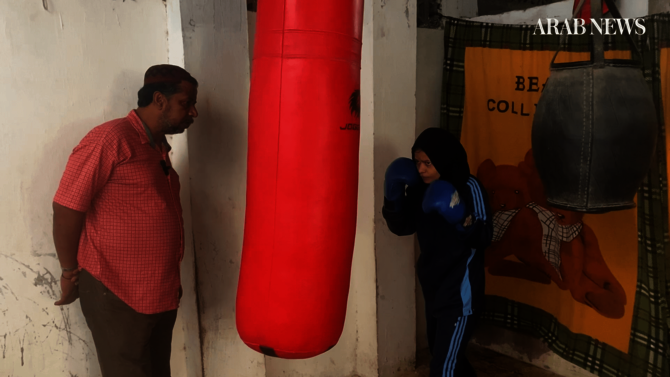KARACHI: Nisar Ahmed was always passionate about pursuing sports, but financial limitations forced him to abandon his dreams and become a clerk at a government office.
Now, four decades later, he is vicariously following his passion through his four daughters, who have made a name for themselves as young boxers in Karachi’s Lyari neighborhood, known just as much for its raw sporting talent, including in boxing and football, as for drug-fueled gang violence.
“When I see my children, I feel like I am watching myself,” Ahmed told Arab News at his Lyari residence, where punching bags were fixed to the ceiling and boxing gloves were scattered all over the floor. “It’s like I am living my childhood again.”
Ahmed’s 23-year-old daughter Nimra is already a professional fighter in the atomweight category.
“There is an Indian movie in which actor Amir Khan gives his daughters rigorous training to become wrestlers,” she told Arab News.
“My father is a real-life hero in the same way. He has taught us to be strong and face the world.”
Nimra is currently preparing to fight Denise Castle, the current atomweight world champion, for the World Boxing Council international title in Dubai next month. Currently at No. 11 in Asia, she is hopeful of winning the competition and aspires to qualify for the world title.
Ahmed said that it was not easy for his daughters to reach this stage and that he faced significant opposition from family and friends when he started training them. Even his wife resisted the idea, thinking it would change the girls’ physical appearance.
“Boxing didn’t do anything to my girls’ faces. If anything, they look healthier and more beautiful now,” said a smiling Ahmed.
“God has given them beauty, courage and honor. They have confidence, and they can face any hardship in the world. I am proud of them.”
Ahmed’s eldest daughter Bakhtawar is the first female ringmaster featured in the Pakistan Super League “Hamaray Heroes” category this year, while his other daughters, Asia and Mahnoor, are amateur boxers also.
All four girls said the road leading to where they are today was cobbled with adversity. People would taunt them and their father and complain to their mother, who was already against the idea of her daughters becoming boxers.
“When we would go to the ground for running or a fight, the neighborhood women, sitting in the street, would get annoyed upon seeing us and complain to our mother, saying ‘Why don’t you ask their father why he is making his daughters do this?'” Nimra said.
“In our society, girls are not considered capable enough, and people think they have to do nothing in the future but get married,” she said.
“Our father not only gave us a good education but also introduced us to a sport like boxing,” Nimra said. “He supported us and trained us. He enabled us to play at the national and international levels and proved those people wrong who said that we are girls and we will be defeated.”
Now, Nimra said, even people who initially opposed the sisters had started praising them.
“Now when people see us, our achievements, they become happy. Our relatives, who used to object to our boxing, now happily tell people that we are their family,” a beaming Nimra said.
The cherry on top for the girls, she said, was the sense of pride and achievement felt by their father.
“He tells us that we are his ‘commanders,'” Nimra added, “and he wants to see which commander conquers which country and brings him which medal.”

